Latino Decisions has released two recent surveys focused on analyzing Latino’s knowledge of the Affordable Care Act (ACA), one national in focus and another specific to the Latino community in Colorado. Both studies reveal a significant need for greater outreach to Latinos that is culturally sensitive. Our data also shows that Latinos will be receptive to this effort, as nearly 90% of the national sample state that they are interested in learning more about the new law. This brief post is intended to address a few questions we have received from the press, the government, and community organizations in the past few weeks since we released the initial results from both surveys. We hope that this information helps the collective effort to better inform Latinos about the benefits of the ACA.
Is lack of ACA information consistent across the Latino population?
The main finding from the two studies was that Latinos reported very low knowledge levels of the ACA and expressed that the new law is “confusing” and “complicated”. The Latino population is incredibly diverse which has motivated several to question whether levels of knowledge vary in any important ways across the various sub-groups of the Latino community. To address this question I have provided break-outs for one of our main measures of ACA knowledge across several demographic indicators. As you can see in the figures below, while there are some differences across sub-groups, overall we see Latino knowledge of the ACA to be rather consistent.
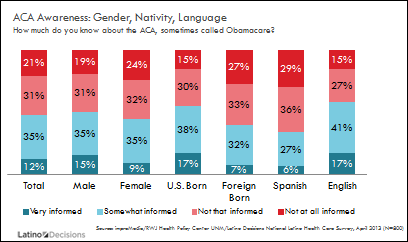
For example, while English speaking Latinos are more likely to express that they are informed about the ACA than Spanish speakers, a large segment (42%) of English dominant Latinos report that they are uninformed. This is similar to the differences based on nativity, with foreign-born Latinos showing slightly lower levels of ACA knowledge than their native-born counterparts. Somewhat surprisingly knowledge levels of the ACA do not vary much across age and educational attainment among Latinos.
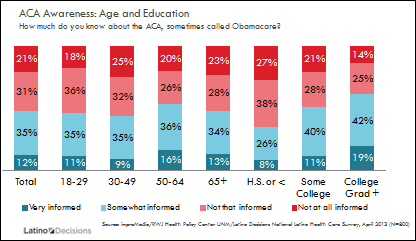
Knowledge levels of the ACA increase with educational attainment, with college graduates expressing greater knowledge of the new health care reform law. However, even 39% of Latino college graduates are either “not at all” or “not that” informed about the ACA. Outreach to Latinos must be comprehensive in nature, as even the highly educated segments of the population have found it difficult to become well informed and knowledgeable about the important legislation.
What Approaches Should be Utilized to Engage Latinos in the ACA?
In my opinion the most valuable information provided in these two surveys is the blue-print that it provides to those interested in engaging the Latino community with the new law. With low knowledge levels consistent across the Latino population, the natural next question is what specific approaches should be utilized to better inform Latinos about the health care law? While we have released a lot of information pertinent to this question already on the blog, I have added some fresh content here to hopefully shed some new light on the subject. In the nationally focused survey we tested a series of messages intended to interest Latinos in learning more about the ACA. As you see in the figure below, all of these messages linked with a specific element of the new law generates a positive response among Latinos. However, some messages such as increasing access to health care through expanding the number of local community health centers and increased availability of medical services such as OB-GYN visits and testing for HIV/AIDS test better than credits for small business.
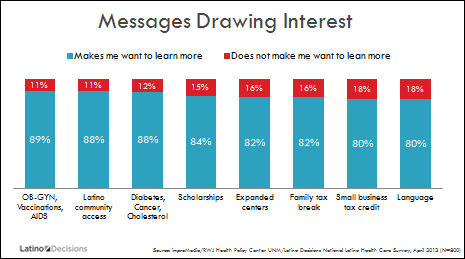
We also included multiple measures focused on the potential effectiveness of specific messengers in the ACA outreach effort. As depicted in the figure below, all of the messengers we showcase here have a lot of traction with the Latino community. Tapping into social networks for outreach will be key given the high number of Latinos who report that they would be more likely to enroll if encouraged by family members and friends. Utilizing Latino doctors will also be key, as they are only outperformed by family members among messengers tested in the survey. Latino teachers however are a group that are not as obvious, but who could be very valuable to increasing Latino engagement with the ACA given the trust and respect Latino families have in this group of potential messengers.
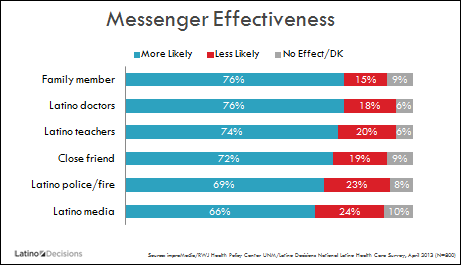
Among potential messengers who did not perform are local small business owners, Latino celebrities, and professional athletes. For example, 40% of Latinos in the national survey reported that they would be less likely to enroll if they were approached by Latino actors or musicians. Entities interested in increasing Latino participation in the ACA will have to think carefully about who they enlist as spokes-people, as utilizing celebrities may have a suppressing effect for Latinos.
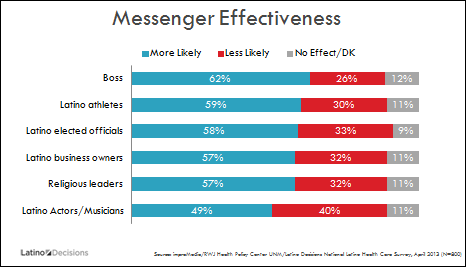
How Important will language be in ACA Outreach?
The final aspect of this discussion focuses on the important role that language will play in the effectiveness of outreach efforts to Latinos. We have already reported that a large percentage (36%) of Latinos report that they prefer information about the ACA be provided in both English and Spanish, along with another 27% who prefer Spanish. However, I am providing the variation to this item by various demographic factors to illustrate that bilingual messaging is important to just about all sub-groups.
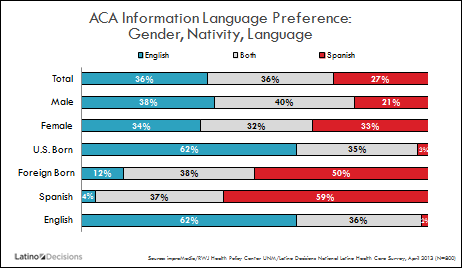
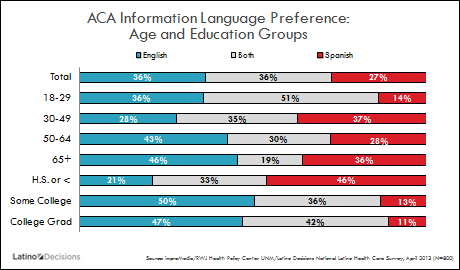
For example, while the majority of US born Latinos prefer ACA information to be provided in English, 35% of this segment of the Latino community indicate that they would like information in both English and Spanish. Similarly, although desire for English focused information increases with educational attainment, even 42% of Latino college graduates indicate that they would like ACA focused information in both English and Spanish. A final indicator of the salience of language to Latinos is the finding that 80% of Latinos in the national sample indicate that they would like to learn more about the ACA after hearing that the new law could increase the number of health care professionals who speak Spanish.
Gabriel R. Sanchez is an Associate Professor of Political Science at the University of New Mexico, Interim Director of the RWJF Center for Health Policy at UNM and Research Director for Latino Decisions. Professor Sanchez has published multiple articles and blog posts on Latino health care attitudes.


